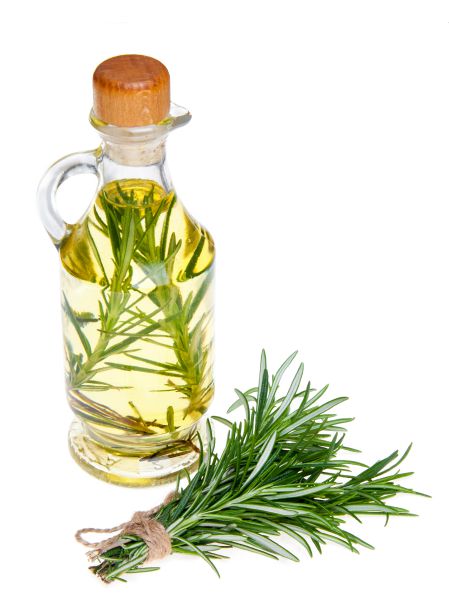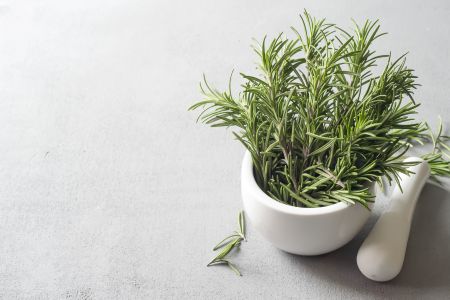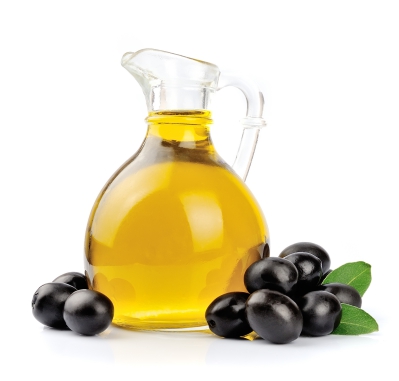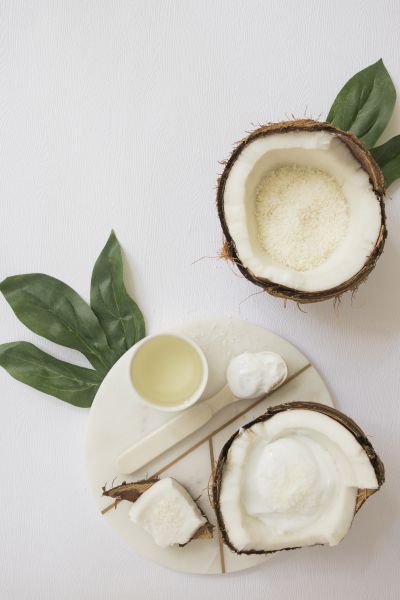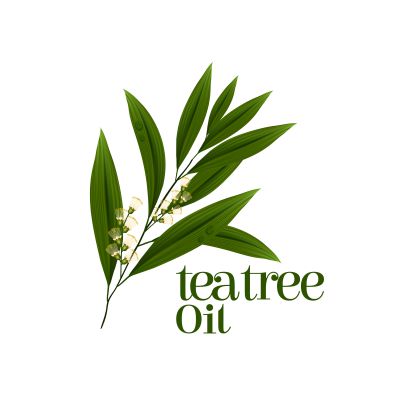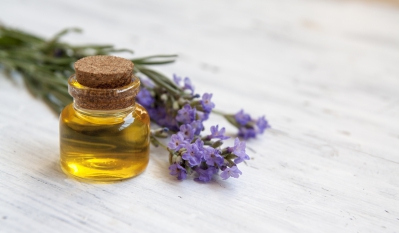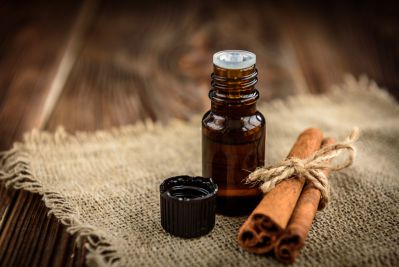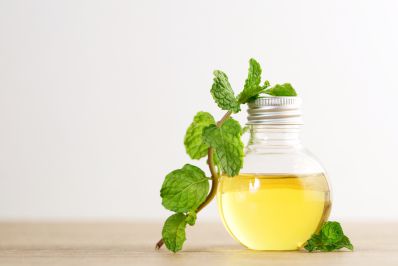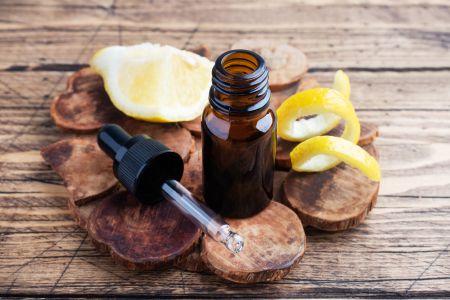Rosemary is an important aromatic herb belongs to mint family of Lamiaceae. The oil extracted from rosemary is an important essential oil, which has various therapeutic advantages and used traditionally for reducing stress as well as for improving memory.
Characteristics
- It is liquid in room temperature
- It is pale yellow in color
- The most important characteristic of this plant is that it does not requires enough water for its growth as well as it can survive in humid weather
Nutritional profile
- It contains both saturated and unsaturated fat but does not contain cholesterol
- It also contains carbohydrate and desirable amount of dietary fibre
- It contains less amount of protein
- It contains several vitamins like Vitamin A, Vitamin C and B Vitamins especially thiamin, riboflavin, niacin, pantothenic acid, pyridoxine and folic acid
- It contains various trace elements also, which include sodium, potassium, iron, copper, zinc, magnesium, manganese and calcium
- It is rich in various biologically active substances such as α–pinene, camphor, camphene, 1,8-cineol, limonene and linalool
Biological properties
Anti-inflammatory property

- α-pinene is an important substance found in rosemary oil responsible for showing anti-inflammatory activities that helps to decrease inflammation, pain and swelling
- It also helps to reduce the prevalence of inflammatory events of body hence reduces the risk of developing chronic diseases
Antioxidant property
- Rosemary oil contains a substance called camphene, which exerts strong antioxidant activity
- It is associated with reducing the concentration of free radicals by scavenging them and protects the body from free radical induced oxidative damages
Anti-carcinogenic property
- Carnosol component of rosemary oil is responsible for exerting anti-carcinogenic activities which help to reduce the growth of malignant cell and their metastasis
- It also helps to suppress tumor cell growth
- It significantly reduces the prevalence of leukemia as well as prostate, breast, cervical, ovarian and bladder cancers
Antimicrobial property
- It shows significant effect on reducing the growth and reproduction of bacteria (especially antibody resistant bacteria), fungus and virus within body, which help to reduces the risk of infectious diseases
- Limonene and beta-pinene components of rosemary oil significantly have antiviral activities and show antiviral effect especially against herpes virus
- It is also related with reducing the prevalence of sexually transmitted diseases
Health benefits

Role on respiratory health
- It is associated with providing relief from respiratory disorders and helps to make the breathing easy
- It helps to dilate bronchi, which facilitates better air flow
- Inhalation of rosemary oil is very beneficial for clearing nasal, throat and chest congestion
- Its antispasmodic activity is very effective for reducing muscular spasm that helps to treat bronchial asthma
- Especially the anti-inflammatory properties of rosemary oil help to reduce the prevalence of lung inflammation that also reduces the risk of developing asthma
- Its antibacterial properties are responsible for reducing allergies, cough and flu
Role on immune system
- It has seen that inhalation of rosemary oil is closely related with enhancing immunological responses of body
- It helps to decrease the susceptibility of developing both communicable and non-communicable diseases
- Its antimicrobial properties are responsible for decreasing the prevalence of communicable disease by inhibiting the growth of bacteria, virus and fungus within host. Whereas its antioxidant as well as anti-inflammatory properties are accountable for reducing the prevalence of non-communicable, chronic diseases
Role on digestive health
- It helps to increase the secretion of gastric juice and bile hence facilitates digestion
- It has seen that rubbing rosemary oil especially on stomach or bottom of the feet can improves the digestibility
- It is also associated with reducing the prevalence of flatulence, constipation, abdominal discomfort and stomach pain

Role on oral health
- Its antibacterial properties are liable for preventing microbial infestation within oral cavity and improves oral hygiene
- It helps to decrease the prevalence of cavities by inhibiting the growth of Streptococcus sobrinus within mouth
- It also helps to prevent dental plaque formation as well as gingivitis
- It acts as a natural mouth wash and can be used by mixing with simple water for improving breath
Role on nervous system
- It has seen that inhalation of rosemary oil is greatly associated with improving brain functions
- It helps to improve cognitive ability
- It also improves memory as well as concentration
Role on mental health
- It plays important role in stimulating mental health
- It has seen that inhalation of rosemary oil is associated with reducing the concentration of cortisol in body, which helps to reduce the stress level
- It also helps to prevent anxiety and depression
- It acts as an effective stimulant, which helps to reduce fatigue as well as tension by enhancing respiratory rate, blood pressure and heart rate. Thus, it has seen that individuals who use rosemary oil are comparatively more energetic than others

Role on circulation
- It improves blood circulation in many folds. It has seen that application of rosemary oil significantly improves blood circulation at the respective area where it has applied
- Proper circulation of blood is an essentially feature required for reducing the risk of strokes and improves cardiac health
- Improved blood circulation can increase the supply of essential nutrients, oxygen, hormones, enzymes and other important biological substances to every cell of the body that facilitates cellular growth and metabolism
- It also helps in rapid wound healing as it increases blood circulation
Role on hepatic health
- It helps to protect the hepatic cell from oxidative damage and promotes the functionality of liver
- It also helps to improve the function of gallbladder as it enhances bile secretion, which is stored in gallbladder and secreted during fat digestion
Role on skin
- It is responsible of increasing the glowing of skin as it enhances blood circulation
- It helps to treat acne
- It helps to protect the skin from oxidative damages
- It also helps to guard the skin from sun damage
- It prevents ageing and helps to tighten the skin
Role on hair

- It helps to stimulate hair growth
- It also helps to make the hair thick and long
- It prevents alopecia (hair loss)
- It also helps to reduce dandruff
- It helps to improve the symptoms of dry or itchy scalp
- It is also associated with preventing premature graying of hair
Role on reducing pain
- It has three important features (analgesic, antinociceptive and anti-inflammatory), which make it a potential pain reliever
- Its analgesic effect is responsible for reducing pain, its antinociceptive effect is accountable for blocking the sensation of pain and its anti-inflammatory effect is liable for reducing swelling and thus it is well utilized for relieving joint pain, muscle pain, pain of arthritis and headache
- 1,8-cineole, camphor and alpha-pinene contents of rosemary oil are responsible for providing the above-mentioned activities
General consideration of using rosemary oil
- It is better to use the oil in diluted form (by mixing with some carrier oil) otherwise it may cause allergic reaction
- Individual who have allergy to aspirin should avoid its usage
- It should be inhaled or consumed in recommended amount or else it may develop digestive disorders, seizures, pulmonary edema. In extreme condition its toxicity may lead to coma


Source:
Ahmed, H.M. and Babakir‐Mina, M., 2020. Investigation of rosemary herbal extracts (Rosmarinus officinalis) and their potential effects on immunity. Phytotherapy Research.
Baker, B.P. and Grant, J.A., 2018. Rosemary & Rosemary Oil Profile.
Ghasemzadeh Rahbardar, M. and Hosseinzadeh, H., 2020. Therapeutic effects of rosemary (Rosmarinus officinalis L.) and its active constituents on nervous system disorders. Iranian Journal of Basic Medical Sciences.
Hamidpour, R., Hamidpour, S. and Elias, G., 2017. Rosmarinus officinalis (Rosemary): a novel therapeutic agent for antioxidant, antimicrobial, anticancer, antidiabetic, antidepressant, neuroprotective, anti-inflammatory, and anti-obesity treatment. Biomed J Sci Tech Res, 1(4), pp.1-6.
Nieto, G., Ros, G. and Castillo, J., 2018. Antioxidant and antimicrobial properties of rosemary (Rosmarinus officinalis, L.): A Review. Medicines, 5(3), p.98.
Nieto, G., Ros, G. and Castillo, J., 2018. Antioxidant and antimicrobial properties of rosemary (Rosmarinus officinalis, L.): A Review. Medicines, 5(3), p.98.
Nivedhitha, A.S., Devi, R.G. and Jyothipriya, A., 2019. Comparative study of the effect of lavender and rosemary oil in relieving pain. Drug Invention Today, 12(4).
Sulung, N. and Aulia, F.F., 2018. Effect Of Rosemary Aromatherapy (Rosmarinus Officinalis) To Memory Of Short-Term Memory In Elderly. Jurnal Endurance, 3(2), pp.247-252.
